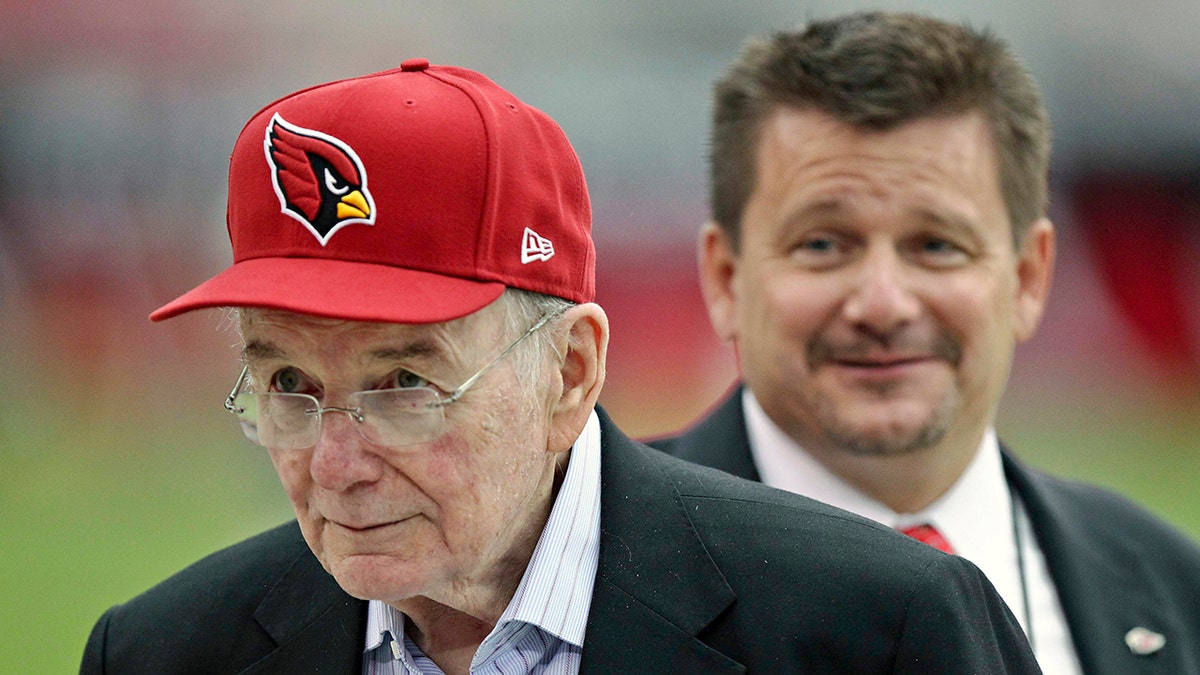Fox News Flash top headlines for Oct. 2
Fox News Flash top headlines for Oct. 2 are here. Check out what's clicking on Foxnews.com
William V. Bidwill, who owned the NFL's Cardinals since 1972 and moved them to Arizona from St. Louis in 1988, has died, the club announced Wednesday. He was 88.
“Our dad passed away today the same way he lived his life: peacefully, with grace, dignity and surrounded by family and loved ones,” Cardinals President Michael Bidwill said in a statement. "We are overwhelmed by the support our family has received, not only now but throughout the latest chapter of his life. We are especially grateful to the nurses, doctors and other caregivers whose endless kindness and compassion in recent years have made our dad’s life so meaningful."
A cause of death was not immediately known. Bidwill, who had long ago ceded day-to-day operation of the franchise to Michael, is survived by his five children, 10 grandchildren and one great-grandchild. His wife, Nancy, died in 2016 at age 84.
“Although never one to seek the spotlight, Bill had an incredible sense of humor and he made extraordinary contributions to the NFL,” NFL Commissioner Roger Goodell said in a statement. “Bill's vision brought the Cardinals, the NFL and multiple Super Bowls to Arizona.
“He was a leader in embracing diversity and employed the first African American female executive, and the first African American general manager and head coach tandem. We extend our condolences to Bill's family and the Cardinals organization, which along with his faith, meant so much to him.”
The bowtie-wearing Bidwill headed a family operation that dated to 1932, when his father Charles purchased the Chicago Cardinals, reportedly for $50,000. The younger Bidwill was a ballboy for the 1947 team that won the franchise's lone NFL championship.
Charles Bidwill did not live to see his team's triumph, dying earlier that year. His widow Violet ran the franchise after that, moving the Cardinals to St. Louis in 1960.
When his mother died in 1962, Bill and his brother, Charles “Stormy” Bidwill Jr., co-owned the team before Bill Bidwill took over sole ownership in 1972.

Bill Bidwill is pictured with son Michael Bidwill, the Cardinals team president, on the sidelines prior to the 2012 NFL season opener against the Seattle Seahawks. (AP Photo/Paul Connors, File)
After a stadium dispute in St. Louis, Bidwill moved the Cardinals to Arizona in 1988 with a handshake agreement that a stadium would be built here for the team. The Cardinals toiled for 18 seasons at Arizona State University's Sun Devil Stadium, often in front of sparse crowds, before voters finally approved a bond measure that resulted in the construction of a state-of-the-art facility in the suburb of Glendale that opened in 2006 and has since hosted two Super Bowls.
The Cardinals' instability off the field was matched by a lack of success on the field. After losing the 1948 NFL Championship Game to the Philadelphia Eagles, the Cardinals made just three postseason appearances over the following 50 seasons and lost all three games. The team ended their half-century following the 1998 season, making the playoffs as a wild card team and upsetting the Cowboys in Dallas.
The franchise's most successful season under Bidwill came ten years later in 2008, when they made a surprising run to the Super Bowl, defeating Atlanta, Carolina and Philadelphia in the playoffs before falling to Pittsburgh 27-23 on a late Steelers touchdown.
At the Super Bowl, Bidwill -- always reluctant to do formal interviews -- spent a few awkward minutes with reporters. He told them he never thought of selling the franchise through all the troubled years.
“It never crossed my mind,” he said. “I love the business, I'm accustomed to it. I don't let it get to me if we have a bad game or a bad year. I just go back into it and try to get better.”
CLICK HERE FOR THE ALL-NEW FOXBUSINESS.COM
Asked how he celebrated his team's NFC championship victory over the Eagles, his answer was pure Bidwill.
“I went home, finished up the morning's coffee in the microwave, went to bed and got a good night's sleep,” he said, “and woke up with a smile.”
Bidwill was born in Chicago on July 31, 1931, and told stories of working in the “cash room'' of the racetrack owned by his father. He attended Georgetown University before joining the Navy. He was discharged in 1956 and began working for the Cardinals.
The Associated Press contributed to this report.

